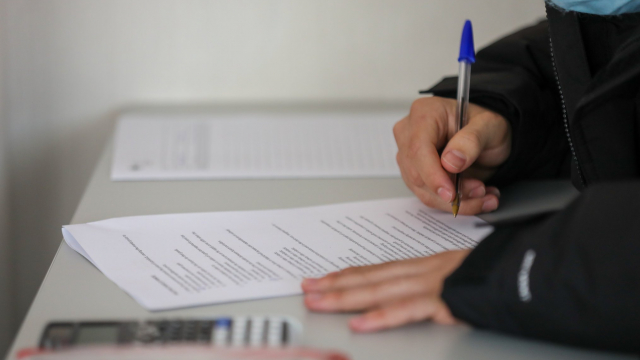The war started by Russia has encouraged the Ministry of Defense, as well as other Latvian security institutions and internal affairs structures, to create various information materials for citizens and to organize training sessions and seminars on how to act in 'X hour' if it ever arrives.
One of the most popular and obvious suggestions is to prepare a 72-hour bag that contains all the necessary things for 3 days, such as food, water, medicine, important documents, warm clothes and sundry other essentials. You can find the English-language version of this advice here: https://static.lsm.lv/documents/1i7.pdf
Have people thought about their actions at X hour, if it takes the expected form? To find out, Latvian Radio spoke to people on the streets of Rīga. Most of the people interviewed honestly admitted that they had neither heard about the booklets created by the ministry and the "72-hour bag" idea, nor had they prepared in any other way for a possible invasion or military attack.
Latvian Radio asked whether people has read the booklet made by the Ministry of Defense and thought about a "72-hour bag"? Those addressed [who are all anonymous] said:
"Definitely not! Life is going to happen as it's supposed to, the '72 hour bag' won't help me when war breaks out."
"I have heard that there are such [booklets]. Yes, we have heard [about the bag]! [But] There are none and there will be none."
"No, but I am ready to prepare it promptly. I think that everyone has an obligation to think about various crisis situations, but you don't need to immediately take such global ones into account, the question of much more mundane ones - have you thought that you will not have electricity at home for a couple of days, what will happen if you don't have tap water or gas at home?"
"[I saw] A representative of the National Armed Forces talking on TV and he listed things, but personally I don't have such a bag prepared. What would it hold? Well, it's too big and heavy. When he started talking, you really have to start thinking about how to put everything in that bag, but for me personally, water would be included, if anything, I'd also have some food laid out, I have pasta, I have something. Personally, I don't have [an action plan prepared], I will listen to the radio."
"I'll wait to see what happens. Where should people run to? To the basement of their house? Is it better? Maybe we ourselves are also to blame for not organizing and doing anything. Yes, somehow I trust that we are in NATO, I have that security."
"Yes, I would say the same, I'm sure nothing will happen."
Riga Stradiņš University security researcher Vitalijs Rakstiņš said that society's readiness for X hour cannot be measured and it can only be tested in real crisis situations. He emphasized that people should take the possible risks of war or military invasion seriously, preparing for various situations in time.
"Each person's individual readiness is also a kind of support for national security, because a person who is able to survive the first three days on his own will make the work of the security authorities easier," said Rakstiņš.
Money
After the war started by Russia against Ukraine, another institution to publish an advice booklet was the Latvian central bank, Latvijas Banka (LB), in cooperation with the Ministry of Defense and other security institutions, on what you need to know about money in the event of a crisis .
Ilze Posuma, a member of the Board of the Bank of Latvia, explained that plans were in place to maintain financial infrastructure but suggested: "Keep small amounts of cash at home every day - about one week's worth of household needs. It is also recommended to keep this money in small denominations. Be sure to familiarize yourself with your ATM card, see where the nearest ATMs are, so that you are better prepared and understand how far to go if you need to. Try to use at least two authentication methods for the bank on your phone or computer. There is definitely a recommendation, which is also relatively simple, to save your bank's contact number on your phone. Remember that fraudsters never sleep."
Posuma also emphasized that all banks in Latvia not only have a plan for working in a crisis, but also trained employees, which means that in case of war or military invasion, the money in the bank will not disappear and the state will protect it. True, if financial services are available and there are no financial difficulties, even in crisis situations you will have to continue to fulfill your credit obligations.
Food
If you can get your money in "X" hours, will you also be able to buy necessary goods in stores, such as food and water? Two of the leading retail chains in Latvia – Maxima and Rimi – indicated that they have their own business continuity plans, which are regularly updated, as well as employee training. The Covid-19 pandemic has given an opportunity to test the plans in real life. Also, currently, experience is being gained from Ukraine. However, the companies pointed out that a possible war or military invasion requires complex solutions and also a clear vision of the responsible state authorities, where currently many questions are unclear about the role and involvement of retailers.
Noris Krūzītis, executive director of the Latvian Food Traders Association, made a similar statement, stressing that retailers know how to act in short-term problems and would be able to successfully continue their work, but in the event of a war or military invasion, there are still many uncertainties about how, for example, stores could operate if electricity supply fails, there is a lack of workers, or in the long term it is not possible to deliver goods and replenish warehouses, thus also providing basic necessities to people.
Krūzītis said: "In the case of war, the retailer, of course, as well as the experience of Ukraine, shows that if he is able to work, then he works, but if we are talking about the direct supply of products, or the supply of basic necessities with such a systematic or plan, then the retailer is not really involved in this scheme or does not currently know such information as to where he should be and what he should do."
How safe?
How safe can Latvian society feel at the moment? Jānis Sārts, director of NATO's Strategic Communication Center of Excellence (STRATCOMCOE), stated that there have been no major changes in the security situation at the moment – as long as Russia is fully involved in Ukraine and waging war there, there is no direct military threat to Latvia, but the intensity of hybrid operations is growing and will continue to grow.
"There is a famous saying - 'You should never prepare for the war that just happened, because the next war will most likely look different in terms of how it looks or how it is implemented.' But in any case, I return to the fact that the basic task is not to think about what that war might look like, but to do everything so that this war does not come here. If we want this war not to come here, a large part of society must be ready to fight, not to murmur. Therefore, I would say that we have to think about what we would do or what our role would be when and if such a scenario were to materialize. Latvia's security is the responsibility of all of us, not just some individual people sitting in Ādaži [military base] or elsewhere," noted Sārts.

























